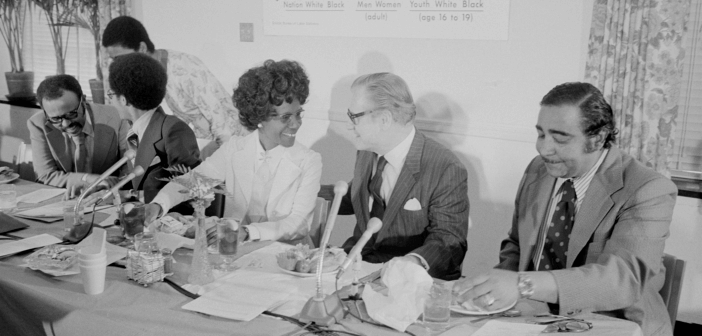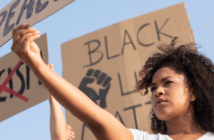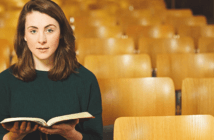Lovett H. Weems Jr. reflects on the legacy of Shirley Chisholm, the first African American woman to serve in congress. Chisholm was an advocate for justice and equality who called the church to focus on the needs of others.
When Shirley Chisholm was raising money for children and youth projects at Janes United Methodist Church in Brooklyn, having joined in 1962, she or other church members could not have imagined all the barriers she would break and doors she would open for herself and others.
Some are just now learning her story through a recently released film entitled “Shirley,” showing in theaters on a limited basis and on Netflix. I have long felt privileged that years ago, when I was a seminarian, Representative Chisholm graciously welcomed me for a conversation with her. It was in her office in the Longworth House Office Building.
The “rediscovery” of Shirley Chisholm goes back to 2019, the 50th anniversary of her entering Congress as the first African American woman ever to serve there. She was also the only woman in her entering class of representatives. At that time, there were only nine Black members of Congress. In 1972, Chisholm became the first African American woman to seek the nomination of a major political party for president of the United States. Although she lost the Democratic nomination that year, she remained in Congress and served seven terms until she retired in 1983. She died in 2005 at the age of 80.
A passion for justice and equity
It is a shame that she and Congressman John Lewis could not have served in Congress at the same time. They shared remarkable similarities that included their extraordinary passion for justice and equity. Their principles were also rooted in their faith, and their personal goals were always secondary to the causes they championed. Chisholm’s slogan for her campaigns never changed. It was “Unbought and Unbossed.”
A call for the church to reassess its role
When I had the opportunity to spend time with Congresswoman Chisholm, it was four months before she announced her presidential campaign. I learned a great deal about how she regarded the church, namely that she felt strongly that the church was failing at applying its values to impact lives and society. She saw a vital role for churches that she already had witnessed among many Black congregations. “The church must provide hope and leadership,” she said, but it must be applied. She regretted that, for many, the church had become a “cloistered setting for escape” rather than a base for applying Christ’s principles in society.
Almost anticipating the current political situation in the United States, she was clear that Christians should avoid “raw political maneuverings,” but focus selectively on those issues that improve the lives of people, especially the weakest and most in need. She felt the church should reassess its role, moving from a concern for itself to an ardent focus on the needs of others.
A controversial visit
Despite her identity with progressive causes and especially racial justice, an action most controversial for her constituents was a visit to a fellow 1972 presidential primary candidate in 1972. Against all the warnings from her advisors, she insisted on going to the hospital to see Alabama Governor George Wallace, a segregationist, after the governor had been shot. The backlash was severe, but she never wavered in saying it was the right thing to do. Later, Wallace helped her secure the final votes she needed in Congress to pass a bill she considered one of her greatest achievements, including domestic workers under the minimum wage law.
Chisholm’s witness celebrated
Shirley Chisholm has received multiple recognitions in recent years. The Shirley Chisholm State Park is the largest state park in New York City. A public monument to her at Prospect Park in Brooklyn will be ready by 2025. A portrait of her now hangs in the office of the House Democratic Caucus. But, like John Lewis, she would be the first to say that what she really wants is for people to remember those for whom she advocated and the causes that drove her life. She once quoted Henry Ward Beecher, saying, “Every tomorrow has two handles; we can take hold of the handle of anxiety, or the handle of faith.”
Related Resources
- Leadership and Racism by Lovett H. Weems Jr.
- Nelson Mandela — A leader for His Time by Lovett H. Weems Jr.
- Leaders Help Their Communities Dream Big Dreams by Doug Powe
Image from U.S. Library of Congress







